Home » Jazz Articles » Big Band Report » In Tune or Not in Tune... That Is the Question
In Tune or Not in Tune... That Is the Question
A while back there was a discussion at a

Stan Kenton
piano1911 - 1979
"Well, there is obviously something wrong with my ears, and I suppose that's a blessing, as most of the soprano solos I've heard (on recordings) have, to me, sounded very much in tune. Logic tells me that if they weren't, some of the other musicians (or those who mixed, mastered, supervised, engineered and carried out other technical chores like that), who presumably have an ear for music, would have noticed and said, 'hey, that's out of tune; let's try it again'—or, 'let's use our space-age technology to correct it.' My brother Tom (a musician himself, amateur division) will say to me, 'He (or she) is playing out of tune.' 'Sounds fine to me,' I'll reply, and so it does. Then I think, 'Why didn't anyone else (besides my brother) notice that while they were recording? They are, after all, musicians, and should know when something is being played out of tune.' It doesn't make sense to me simply to release a recording on which someone is playing 'out of tune' because that is the path of least resistance. There are, after all, such things as multiple takes and, these days, even electronic correction.
"The occasions on which I've heard (perhaps I should say 'noticed') someone playing 'out of tune' have been extremely rare. That's not the same as being put off by the 'sound' of a saxophone (or clarinet, or any other instrument). Obviously, there are some who sound better than others (

Zoot Sims
saxophone, tenor1925 - 1985

Kenny G
saxophone, sopranob.1956
That's how it looks from one non-musician's point of view. I may be completely off base, so please feel free to poke holes in the argument wherever warranted. I would, of course, expect you to back up your opinion with facts, which may prove difficult in this particular case, as "in tune" or "out of tune" can sometimes lie in the ear of the beholder. In other words, one listener's

Jo Stafford
vocals1917 - 2008
And that, dear readers, is how to make a column out of nothing. I hope you've been taking notes.
Swingin' on a Riff
Toward the end of May, Betty and I plan to be in Los Angeles (at the Airport Marriott Hotel) for the Ken Poston / L.A. Jazz Institute's latest extravaganza, "Swingin' on a Riff: Big Band Masters of the Twenty-First Century," the dates for which are May 23-26. Four films, four panel discussions and no fewer than seventeen concerts in four days, more than enough to assuage anyone's appetite for big bands. There'll be plenty of big names too:

Bill Holman
composer / conductor- 2024

Don Menza
saxophoneb.1936

Bobby Shew
trumpetb.1941
Tom Kubis
arranger
Mike Barone
composer / conductorb.1936

Pete Christlieb
saxophoneb.1945

Roger Neumann
saxophone, tenorb.1941

Gary Urwin
band / ensemble / orchestra
Bill Watrous
trombone1939 - 2018
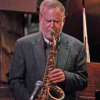
Kim Richmond
saxophone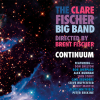
Steve Huffsteter
trumpet
Alan Broadbent
pianob.1947
RIP, Derek Watkins
British trumpeter Derek Watkins, a star lead player in several big bands who also performed on the soundtracks of all twenty-three James Bond films, died of cancer March 22 at age sixty-eight. Fellow trumpeter

Dizzy Gillespie
trumpet1917 - 1993
Ted Heath
b.1900
John Dankworth
saxophone1927 - 2010

Benny Goodman
clarinet1909 - 1986
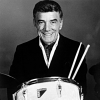
Louie Bellson
drums1924 - 2009

Don Menza
saxophoneb.1936

Count Basie
piano1904 - 1984

Oscar Peterson
piano1925 - 2007

Frank Sinatra
vocals1915 - 1998
Recent Big-Band Releases
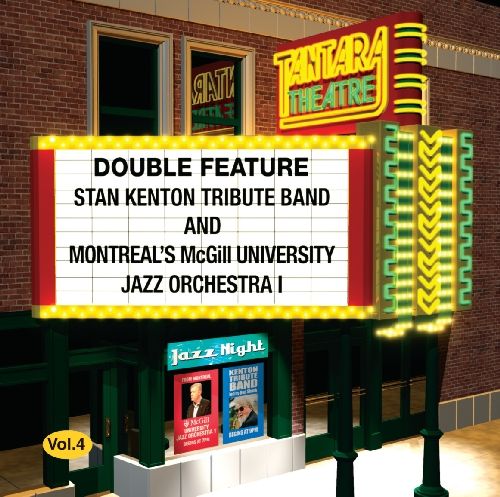 Stan Kenton Tribute Band / McGill University Jazz Orchestra 1
Stan Kenton Tribute Band / McGill University Jazz Orchestra 1Double Feature, Volume 4
Tantara Productions
2013
As the title denotes, this is the fourth in a series of double-CD packages produced by Bill Lichtenauer's Tantara Productions devoted to the music of

Stan Kenton
piano1911 - 1979
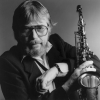
Bud Shank
saxophone1926 - 2009

Bob Cooper
saxophone1925 - 1993

Bill Perkins
guitar1924 - 2003

Conte Candoli
trumpet1927 - 2001
Jiggs Whigham
b.1943
Pete Rugolo
composer / conductor1915 - 2011

Bill Holman
composer / conductor- 2024

Bobby Shew
trumpetb.1941

Frank Capp
drumsb.1931

Doug Miller
bassMilt Bernhart
tromboneb.1926
After opening with Kenton's swinging, seldom-heard arrangement of the traditional folk song "Arkansas Traveler" from 1941 and a chorus of his first sizable hit, "Eager Beaver," from two years later, Disc 1 embodies features for Cooper (

Shorty Rogers
trumpet1924 - 1994

Maynard Ferguson
trumpet1928 - 2006
Holman is prominent again on Disc 2, having written and arranged the first three numbers: "The Opening," "Tenor Piece" and "Cuba Jazz" (which should be heard more often). Rugolo is represented by "Artistry in Gillespie" and "Three Bop" along with his arrangements of

Charlie Parker
saxophone, alto1920 - 1955

Manny Albam
arranger1922 - 2001
Ken Hanna
b.1921Russo is up next with the buoyant "Esthete on Clark Street," which brings out the best in trombonists Geoff Cronin, Alex Truelove and Taylor Donaldson. Pianist Andrew Boudreau is front and center on the brooding "Vignette," guest altos

Remi Bolduc
saxophone, alto
Johnny Richards
composer / conductor1911 - 1968
In a blindfold test, you'd have a hard time convincing anyone that the McGill Jazz Orchestra isn't a professional working group (yes, they're that good), while the consummate artistry of the Kenton Tribute Band speaks for itself. If you've been waiting for a letdown in this splendid series, you'll have to wait a while longer, as the latest edition is by any measure as stellar as those that have come before it. Some listeners, in fact, may suggest that Volume 4 is in many ways superior to its precursors, an opinion this reviewer would not deign to challenge.
 Rob Parton Big Band
Rob Parton Big BandWe'll Be Together Again
JazzTech Records
2013
Before moving to Columbus, Ohio, in 2010, trumpeter
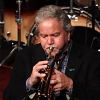
Rob Parton
trumpetThe album's centerpiece is
Eric Richards
bass, electricb.1953
Mike Pinto
guitarBob Rummage
drums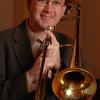
Tim Coffman
trombone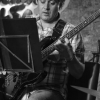
Victor Garcia
trumpetRichards' opus is preceded by "Serenade to a Bus Seat," Parton's buoyant tribute to trumpeter

Clark Terry
trumpet1920 - 2015

Ted Hogarth
saxophone, baritone
Joe Henderson
saxophone1937 - 2001

Thelonious Monk
piano1917 - 1982

Mark Colby
saxophone1949 - 2020

Joe Policastro
bass, acousticb.1977
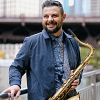
Chris Madsen
saxophone, tenor
John Wojciechowski
saxophone, tenor
Miles Davis
trumpet1926 - 1991

Bill Evans
piano1929 - 1980
Welcome back to Chicago, Rob. And welcome, Rob Parton Big Band. We hope you'll be together again for at least another thirty-year run.
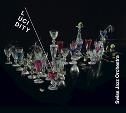 Swiss Jazz Orchestra
Swiss Jazz OrchestraLucidity
Mons
2013
Lucidity, the most recent album by the metronomic Swiss Jazz Orchestra, which runs, if you'll pardon the blatant pun, like clockwork, is comprised of half a dozen compositions and arrangements by pianist Philip Henzi and one more co-written by Henzi and Gregor Hilbe. To help ensure quality control, the SJO invited the great Belgian composer / arranger / trumpeter

Bert Joris
trumpetBe that as it may, Joris presides over a series of varied and engaging themes that lend the orchestra numerous opportunities to shine, which it does in every instance. The word "themes" is used because Henzi's music is thematic: "Losing Lucidity" denotes "the loss of control in a dream-like stage"; "A Chaser" was "inspired by a dream in which random images and episodes follow each other at high speed"; "Figment" traces "a nocturnal scene—a lake, a lighthouse, a deserted playgound," and so on. The album closes with the entirely dissimilar and esoteric "Figment (Remix)," co-written by Henzi and Hilbe (and including what sounds like a turntable). This may have been added late, as pianist

Jim McNeely
composer / conductorb.1949
Henzi's other songs are "Bathyal," which, he writes, "represents the ocean from a depth of 1000—4000 meters"; "Promenade," a "hidden door into a mystic room full of colorful print cylinders," and "Teebeutelregen," a look at Bern's old town, where "it is raining tea bags and a horse carriage speeds through the alley." While the listener may or may not apprehend those images, the music has a meaning of its own that is clearly worth considering. Even though the orchestra is most often in the forefront, the SJO's soloists are first-rate, starting with trombonist Stefan Schlegel and soprano Adrian Pflugshaupt ("Losing Lucidity") and continuing with trumpeter
Johannes Walter
trumpetb.1979
Jurg Bucher
saxophone, tenorWhen all is said and done, Lucidity is music for the open-minded, not necessarily for those who hold fast to tradition, especially as it applies to big-band jazz. Henzi is a perceptive composer, but what he has in mind may not mirror everyone's idea of what a big band should embody. Fans of Basie, Herman, Rich or even Ellington / Kenton should take that for what it's worth.
 The Ian McDougall 12Tet
The Ian McDougall 12TetLive
Self Published
2013
Put a dozen immoderately talented jazz musicians in one room, as trombonist " data-original-title="" title="">Ian McDougall has done on Live, and you almost can't help but produce an album that crackles with high-powered enthusiasm as it swings easily from one emphatic measure to the next. Oh, to have been there to see and hear this excellent concert, presented in March 2012 at the Cellar Club in Vancouver, BC. Luckily, it was recorded, so those who weren't there can at least eavesdrop and appreciate what twelve perceptive, single-minded men are able to accomplish when the stars align and the time is right.
It's clear from the outset that this is to be a concert like few others, as tenors
Ross Taggart
piano
Ben Webster
saxophone, tenor1909 - 1973

Gene Ammons
saxophone, tenor1925 - 1974

Dexter Gordon
saxophone, tenor1923 - 1990

Sonny Stitt
saxophone1924 - 1982

Wardell Gray
saxophone, tenor1921 - 1955

Johnny Griffin
saxophone, tenor1928 - 2008

Eddie "Lockjaw" Davis
saxophone, tenor1922 - 1986

Horace Silver
piano1928 - 2014

Woody Herman
band / ensemble / orchestra1913 - 1987

Don Thompson
bassb.1940

Kenny Dorham
trumpet1924 - 1972
One feature of McDougall's ensemble that stands out is that each of its members is not only an unwavering team player but an exemplary soloist as well. Besides the tenors and altos already named, they include bassist

Ken Lister
bass, acousticb.1962

Brad Turner
trumpetCraig Scott
composer / conductorb.1956
McDougall, who logged twenty years as lead trombonist with

Rob McConnell
trombone1935 - 2010
 Asuka Kakitani Jazz Orchestra
Asuka Kakitani Jazz OrchestraBloom
Nineteen / Eight Records
2013
In the introduction to her debut recording, Bloom, Japanese-born composer / arranger
Asuka Kakitani Jazz Orchestra
band / ensemble / orchestra
Charlie Parker
saxophone, alto1920 - 1955
To accomplish her purpose, Kakitani has formed an eighteen-member ensemble comprised of some of the New York City area's most accomplished musicians, seasoned professionals to whom she can entrust her music without any thought of mishap. They don't let her down. The artistry is first-class, sound quality the same. As for the music, Kakitani proves beyond any doubt that her award-winning resume is accurate. Her compositions and arrangements are clear-eyed and colorful, leaning more toward

Toshiko Akiyoshi
pianob.1929

Maria Schneider
composer / conductor
Sara Serpa
vocalsb.1979

Kenny Berger
saxophone, baritoneb.1947
Even though Kakitani's themes are in the forefront, she has a number of proficient soloists in the band and is sharp enough to leave room for them to have their say, starting with trumpeter

John Bailey
trumpet
Jason Rigby
saxophone, tenorb.1974

Dave Ambrosio
bass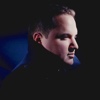
Mike Eckroth
piano
Pete McCann
guitarb.1966
Matt McDonald
trombone
Mark Ferber
drums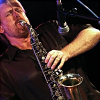
John O'Gallagher
saxophone, altob.1964

Jacob Garchik
trombone
Ben Kono
saxophone, tenorb.1967

Matt Holman
trumpet
Mark Small
saxophone, tenor
Mark Patterson
tromboneb.1960
While Kakitani shows that she can swing when she has to, Bloom would never be confused with Basie, Herman, Kenton or their kin. The mood is for the most part decorous, and shout choruses are rare. Having said that, it's clear that Kakitami knows her way around a big band and can bring out the best in an ensemble. That she does so on Bloom is a tribute to her unfolding expertise and vision.
 NSU Jazz Ensemble
NSU Jazz EnsembleOn Cue: The Music of Seamus Blake
NSU Jazz Lab
2013
Saxophonist

Seamus Blake
saxophoneb.1970
As a composer, Blake has Mingus' ear for an engaging melody and rhythms that swing without pretense. On the other hand, while he clearly respects Mingus as a springboard, Blake's compositions are as a rule more accessible and less thematic. They do, however, move in many cases from relatively quiet beginnings to thunderous climaxes, employing credible dissonances along the way to fan the flames, both hallmarks of Mingus' singular approach. Having played the role of sympathetic collaborator through the first half-dozen numbers, Blake chooses to give the students a saxophone lesson on the shuffling, New Orleans-style "Zydeco," unfurling a sensational unaccompanied coda that consumes more than three minutes as it closes the session on a remarkably high note.
This follows a series of engaging themes in which the NSU ensemble shows why Blake would agree to come to Tahlequah to teach and record, as

Russell Malone
guitar1963 - 2024

Robin Eubanks
tromboneb.1955

Bobby Watson
saxophone, altob.1953
After listening to On Cue, the obvious conclusion is that big-band jazz is alive and well in unassuming Tahlequah, OK, at the foothills of the Ozark Mountains. Kudos all around, for Poole, the NSU ensemble and their multi-talented guest, Seamus Blake.
In Smaller Packages . . .
 Jack Mouse Group
Jack Mouse GroupRange of Motion
Origin
2013
Jack Mouse, a sure-handed, high-energy drummer who is best known as a dependable timekeeper for groups large and small on the Chicago scene and elsewhere, moves to the head of the class on Range of Motion, leading a quintet whose members share his expansive, something-for-everyone point of view. Apart from his role as rhythmic helmsman, Mouse also writes, and writes quite well, having composed all of the album's ten selections, themes whose "range of motion" is broad and impressive.
Sharing front-line duties are the chameleon-like

Scott Robinson
saxophone, tenorb.1959

Bobby Shew
trumpetb.1941

Marvin Stamm
trumpetb.1939
Bob Summers
trumpetb.1944

John McLean
guitar "
data-original-title="" title="">Bob Bowman (five tracks) or
"
data-original-title="" title="">Bob Bowman (five tracks) or 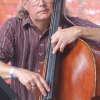
Kelly Sill
bass, acoustic
John LaPorta
clarinet1920 - 2004
"Raucaus Caucus," a rhythmic air with an African subtext, precedes "The Breezeling," Mouse's easygoing salute to

Henry Mancini
composer / conductor1924 - 1994

Shelly Manne
drums1920 - 1984
 The Dave Young / Terry Promane Octet
The Dave Young / Terry Promane OctetOctet Volume One
Modica Music
2013
More splendid music from north of the border courtesy of the

Dave Young
saxophone, tenorb.1940

Dave Pell
saxophone1925 - 2017

Dizzy Gillespie
trumpet1917 - 1993

Thad Jones
trumpet1923 - 1986

Charles Mingus
bass, acoustic1922 - 1979

Hank Mobley
saxophone, tenor1930 - 1986

Sam Jones
bass, acoustic1924 - 1981
Much is made of the "Toronto sound," which Promane says is "complicated, but generally relies on a few crucial ingredients: exciting, well-crafted and uniquely voiced arrangements, a distinctly Canadian musical sensibility, impeccable tuning, flawless execution and world-class solos." No pressure there. And if there were any, the garden-variety listener would never perceive it. Everyone plays "Toronto-style," which must, for starters, also embrace the adjectives "charming" and "persuasive." The charts are indeed well-crafted and uniquely voiced, the tuning spotless, the execution unblemished, the solos world-class. It all starts with Gillespie's fiery "Manteca," on which trumpeter

Kevin Turcotte
trumpetb.1964

Terry Clarke
drumsb.1944
Dizzy resurfaces with "A Night in Tunisia" (solos by Turcotte and trombonist Promane), preceding Thad Jones' "To You," nicely arranged by Young who solos with Williamson and baritone Perry White, and Wilkins' rhythmically intense "Soundings" (Dorge, Promane, Clarke). In Promane's capable hands, the

Benny Goodman
clarinet1909 - 1986

Chick Webb
drums1905 - 1939
Edgar Sampson
b.1907
Mike Murley
saxophone, tenorOctet Volume 1 is one of those remarkable sessions that don't turn up often but can be recommended without pause to anyone who appreciates jazz as it should be played. Bravo to Dave Young and Terry Promane for producing it. Let us hope that a Volume 2 is already in the works.
 Kathleen Lee
Kathleen LeeComing Up for Air
Maybe This Time Music
2013
Coming Up for Air is an agreeable pastiche by singer / songwriter Kathleen Lee, one that doubles as a tribute to her hometown, New Orleans, which even now continues its recovery from the devastating effects of Hurricane Katrina in 2005. Lee, a radio host who lost her possessions and had to evacuate the city in the wake of the storm, was soon back on the air on WWOZ-FM, broadcasting her jazz program from a remote location in Baton Rouge. She'd already begun work on a CD, and was convinced by Katrina to complete it as a way of showing the world that New Orleans may have been dealt a crippling blow by the hurricane but was far from lifeless.
Lee mixes things up, blending standards and originals (two of her own, two others by Nick Faust Jr.), ballads, blues, gospel and gasconade. She is accompanied for the most part by groups ranging from five to seven, the exceptions being "You Better Go Now" (with pianist
Fred Sanders
pianoDavid Pulphus
bass
Jeri Southern
vocals1926 - 1991

Peggy Lee
vocals1920 - 2002
Were it up to me, I'd have opened the album with a stronger track than "Lady Be Good," on which Lee sounds a tad indecisive and scats to no great effect. On the other hand, "Lady" does swing nicely, a brisk counterpoint to "La Lumiere" and the songs that follow: Faust's bluesy "Meet My Baby on the Night Train,"

Eugene McDaniels
vocals1935 - 2011
Tracks and Personnel
Double Feature, Volume 4
Tracks: CD1: Opening Remarks; Arkansas Traveler; Eager Beaver; Pete Rugolo introduction; Collaboration; Machito introduction; Machito; Bob Cooper introduction; Coop's Solo; Conte Candoli introduction; Pennies from Heaven; Band introduction; Bobby Shew introduction; Maynard Ferguson; Bill Perkins introduction; Yesterdays; Bud Shank introduction; Stella by Starlight; Bill Holman introduction; The Tall Guy; Closing remarks; Artistry in Rhythm; Stompin' at the Savoy. CD2: The Opener; Tenor Piece; Cuba Jazz; An Esthete on Clark Street; Vignette; It's the Talk of the Town; Autumn Leaves; Guane; Durango; Smoke Gets in Your Eyes; All the Things You Are; Artistry in Gillespie; Yardbird Suite; Three Bop.
Personnel: CD1:Milt Bernhart: emcee; Bobby Shew: trumpet; Conte Candoli: trumpet; Gary Barone: trumpet; Brad Allison: trumpet; Jay Thomas: trumpet; Bud Shank: alto sax; Greg Metcalfe: alto sax; Bob Cooper: tenor sax; Bill Perkins: tenor sax; Bill Ramsay: baritone sax; Jiggs Whigham: trombone; Wayne Andre: trombone; Dan Marcus: trombone; Mike Barone: trombone; Ken Shirk: bass trombone; Dave Barduhn: piano; Doug Miller: bass; Frank Capp: drums. CD2: Gordon Foote: director; Dominic Rossi: trumpet; Andy King: trumpet; Andre Wickenheiser: trumpet; Darelos Katsanikakis: trumpet; Caroline Johnson: trumpet; Benjamin Deschamps: alto sax; Michael Johancsik: alto sax; Mike Bjella: tenor sax; Alexandre Beauregard: tenor sax; Andrew Morrill: baritone sax; Taylor Donaldson: trombone; Alex Truelove: trombone; Geoff Cronin: trombone; Karine Gordon: trombone; Felix Del Tredici: bass trombone; Andrew Boudreau: piano; Maxime Tremblay: guitar; Mike De Masi: bass; Mat McEachern: drums. Guest artists—Remi Balduc: alto sax; Donny Kennedy: alto sax; Kiko Osario: Latin percussion.
We'll Be Together Again
Tracks: Serenade to a Bus Seat; Tetragon; Ugly Beauty; I Love You; Fantasy for Trumpet and Jazz Orchestra (Gold / Copper / Silver); Coda; We'll Be Together Again; Blue in Green; I Remember You.
Tags
Big Band Report
Jack Bowers
United States
Stan Kenton
Zoot Sims
Kenny G
Jo Stafford
Bill Holman
Don Menza
Bobby Shew
Tom Kubis
Bob Curnow
Mike Barone
Pete Christlieb
Roger Neumann
Gary Urwin
Bill Watrous
Kim Richmond
Steve Huffsteter
Alan Broadbent
Dizzy Gillespie
Ted Heath
John Dankworth
Benny Goodman
Louie Bellson
Count Basie
oscar peterson
frank sinatra
Bud Shank
Bob Cooper
Bill Perkins
Conte Candoli
Jiggs Whigham
Pete Rugolo
Frank Capp
Doug Miller
Milt Bernhart
Shorty Rogers
Maynard Ferguson
Charlie Parker
Manny Albam
Ken Hanna
Remi Bolduc
Johnny Richards
Rob Parton
Eric Richards
Mike Pinto
Bob Rummage
Tim Coffman
B.J. Cord
Victor Garcia
Clark Terry
Ted Hogarth
Joe Henderson
Thelonious Monk
Mark Colby,
Joe Policastro
Chris Madsen
John Wojciechowski
Miles Davis
Bill Evans
Bert Joris
Jim McNeely
Johannes Walter
Jurg Bucher
Ian McDougall
Ross Taggart
ben webster
Gene Ammons
Dexter Gordon
Sonny Stitt
Wardell Gray
Johnny Griffin
Lockjaw Davis
Horace Silver
Woody Herman
Don Thompson
Kenny Dorham
Ken Lister
Oliver Gannon
Brad Turner
Craig Scott
Rob McConnell
Asuka Kakitani
Toshiko Akiyoshi
Maria Schneider
Kenny Berger
John Bailey
Jason Rigby
Dave Ambrosio
Mike Eckroth
Pete McCann
Matt McDonald
Mark Ferber
John O'Gallagher
Jacob Garchik
Ben Kono
Matt Holman
Mark Small
Mark Patterson
Seamus Blake
Russell Malone
Robin Eubanks
Bobby Watson
Scott Robinson
Marvin Stamm
Bob Summers
John McLean
Bob Bowman
Kelly Sill
John LaPorta
Henry Mancini
Shelly Manne
Dave Young
Dave Pell
Thad Jones
Charles Mingus
Hank Mobley
Sam Jones
Kevin Turcotte
Terry Clarke
Chick Webb
Edgar Sampson
Mike Murley
Fred Sanders
David Pulphus
JERI SOUTHERN
Peggy Lee
Gene McDaniels
Comments
PREVIOUS / NEXT
Support All About Jazz
 All About Jazz has been a pillar of jazz since 1995, championing it as an art form and, more importantly, supporting the musicians who make it. Our enduring commitment has made "AAJ" one of the most culturally important websites of its kind, read by hundreds of thousands of fans, musicians and industry figures every month.
All About Jazz has been a pillar of jazz since 1995, championing it as an art form and, more importantly, supporting the musicians who make it. Our enduring commitment has made "AAJ" one of the most culturally important websites of its kind, read by hundreds of thousands of fans, musicians and industry figures every month.





 Buy Now
Buy Now




















